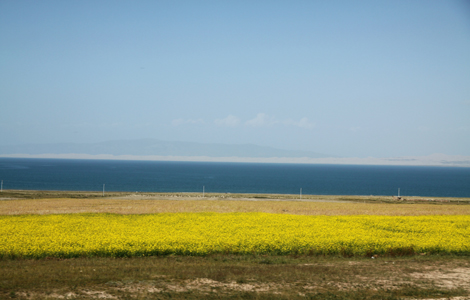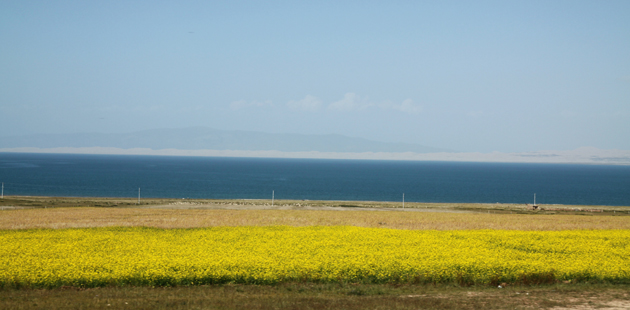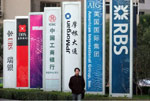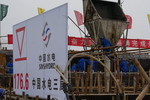Trade with Arab states sets H1 record
Updated: 2011-09-23 09:09
By Li Jiabao and Ding Qingfen (China Daily)
|
|||||||||||
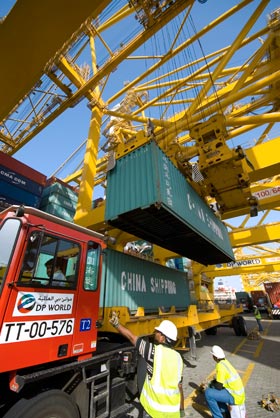 Containers owned by China Shipping Container Lines Co Ltd are offloaded at a port in Dubai, United Arab Emirates.?[Photo/Agencies] |
YINCHUAN, Ningxia - China's trade with the Arab states reached a record high in the first half, and Arab countries expect deeper trade ties with China, officials said.
Trade between China and the Arab states totaled $120 billion, up 36 percent year-on-year, He Zhengrong, vice-director general of the commerce bureau of Ningxia Hui autonomous region, told a news conference during the Second China-Arab States Economic and Trade Forum.
The forum, held in Ningxia from Sept 21 to 25, serves as a platform for deepening trade and investment cooperation between China and 22 Arab states, such as Saudi Arabia, Libya and Syria.
The western Asian and northern African regions experienced turmoil during the first half, and China's trade with affected Arab countries and regions, such as Libya and Egypt, declined by 30 percent year-on-year.
But trade with politically stable Arab states surged by 46 percent. The turmoil "does not affect China's overall trade potential and prospects with the Arab states", He said.
Mohammed Bin Essa Al-Khalifa, chief executive of the Bahrain Economic Development Board (BEDB), said trade potential between China and the Arab states is great and Gulf countries expect to deepen the trade relationship with investments.
"The turmoil in those regions had some impact on Bahrain in March, but growth rebounded strongly in the second half of this year.
"We are forecasting 5 percent (year-on-year GDP) growth in the fourth quarter and 3 percent growth over the full year," he said.
The GDP growth rate for Bahrain is forecast at 5.3 percent in 2012 and 5.7 percent in 2013, according to the BEDB.
China's trade with Bahrain reached $1.05 billion in 2010, up 53.1 percent year-on-year But Bahrain, the gateway for Chinese investments to "access and take advantage in the Gulf", is not only eyeing expanded trade volume, it is enhancing the trade climate with mutual investments, he said.
"Strategically, we need to change the level of the trade relationship. Today, the trade is, we sell you oil and buy products from China. And you get the money back.
"We would like to invest in each other. As long as we have more investments, the trade will grow," he said.
Bahrain is welcoming Chinese investments to its priority industries including housing, construction, downstream manufacturing of aluminum, petrochemicals and food production.
"We are planning to build 50,000 homes, worth more than $5 billion, in four years. Last week, we talked with some Chinese companies and we are looking for Chinese expertise and the technology to build the homes less expensively," he said.
Li Guanghui, an expert from the Chinese Academy of International Trade and Economic Cooperation affiliated to the Ministry of Commerce, was optimistic about China's investments in the Arab countries.
"The political turmoil affected Chinese investments in some Arab countries but not in the whole Arab world. Chinese investments are likely to continue to increase because the turmoil is settling down and Arab countries are drawing up policies to attract foreign investment and expand the market," said Li.
The Arab states as a whole are China's seventh-largest trade partner.
Related Stories
China-Arab forum opens in NW China 2011-09-21 11:53
China looks to Arab states for opportunities 2011-04-09 09:13
Free trade agreement another boost to business 2011-09-16 08:00
Debt crisis may cause more trade friction 2011-09-21 07:51
- AstraZeneca relies on partners
- Hurun shows property is still key to riches
- China IPOs to hit record in Germany
- Trade with Arab states sets H1 record
- Car Free Day fails to get traffic off roads
- Liquidity remains tight despite cash injection
- China's manufacturing continues to contract in Sept
- Billionaires shy away from rich list


